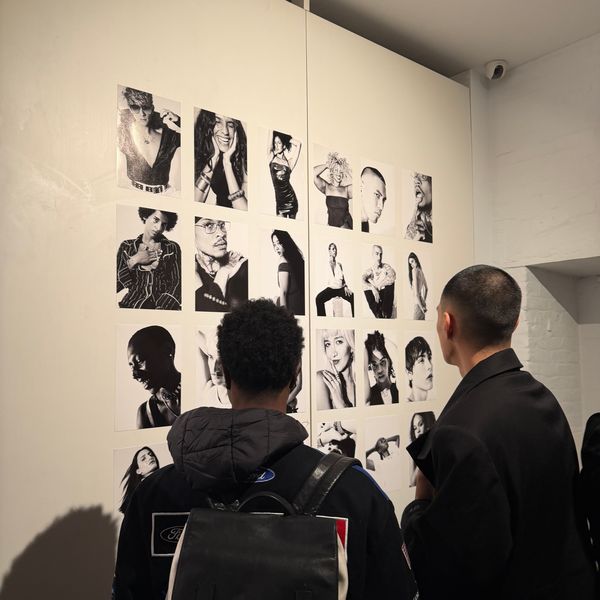There Are 'It' Girls, and There Are 'Stargirl's
Emma Glenn Baker’s podcast is obsessive, earnest, sometimes off-putting, and always enthralling.

As a journalist, you’re not supposed to project onto your interview subjects. You shouldn’t assume you know what they’re going to say next, you shouldn’t cut them off to interject with your own understanding of the topic at hand, and you shouldn’t think, over and over, “I really get her.” But that’s what I did with Emma Glenn Baker, host of the Stargirl podcast. See, I had listened to her voice for hours; I heard her talk about her life in Seattle, her attempts to make it in New York as a writer, her relationships with dance and yoga and her body. I thought I knew her, but like so many relationships these days, it was entirely one-sided.
Well, not entirely. Baker had read some of my work, but we aren’t friends. She’s not friends with any of the women she covers on her podcast, either. When I reveal my own parasocial thoughts about her, she laughs and says, “That’s the circle of life. Clearly, I’m not alone in how I consume people.”
It’s a slip of the tongue, but it says a lot. On each episode of Stargirl, Baker meticulously breaks down the appeal of one luminous figure, picking apart their social media content, their work history, their biography, and most interestingly, their public persona and its cultural reception. She isn’t just talking about her subjects; she’s digesting them. Over the four dozen episodes so far, she’s chewed on niche celebrities like literary critic Lauren Oyler and notorious essayist Caroline Calloway, but also megawatt superwomen like Taylor Swift and Gwyneth Paltrow. The thing that makes Stargirl electric to listen to is its freewheeling nature and its seemingly no-holds-barred approach. It’s gossipy, yes, but that’s offset by moments of shrewd insight. (For instance, in a recent episode, Baker made a case for a cultural vibe shift toward a dirty, decadent, slightly pagan, and psychedelic-infused summer—a concept that has already borne out over the past few months in music drops from Kacey Musgraves and Florence Welch and in the boho resurgence in fashion.) As a host, Baker comes across as playful and self-aware, but nonetheless deeply engaged with her topic. And if you boil it down, her overall project is really not about any individual person. It’s about the zeitgeist itself.
That’s one thing that differentiates a “Stargirl” from an “It Girl.” According to Baker, Stargirls are “emblems of their genre, their mode. They are one of one, not one of many.” That’s the first thing each of her subjects need to be—unique, distinct, a tall poppy rising above the field. But they also have to be “dynamic.” She says, “A Stargirl generates conversation just by being themselves. They’re not necessarily trying to be controversial or inflame; they just have a kinetic energy.” She compares Sofia Richie (an It Girl) with Emily Ratajkowski (a Stargirl). One is admired and praised for her tasteful wedding, her pretty face, her aspirational social media content. The other is derided and lauded in equal measure—for her beauty, her body, her writerly musings, and her decision to MILF harder than anyone has since the days of Stifler's mom. EmRata is canny and mesmerizing but she’s also so clearly performing for the public. And Baker, like the rest of us, can’t seem to look away.
While Baker enjoyed doing the EmRata episode, she also reveals that some people have impacted her far more than others. Talking to Baker, it becomes clear that there was one woman who sat higher in her esteem—and subsequently fell harder—than the elevated others. Baker moved to New York City in 2018 to study cultural criticism in the graduate program at NYU’s journalism school, and she had a clear vision of where she wanted the program to take her. “I came to New York with the idea that I wanted to be Jia Tolentino,” she reveals. “I wanted to write about girly things in a cultural criticism, essayistic way.” As she moved further into her own work, Baker realized that her best clips were all about women and their affects. She looked to Tolentino as a “point on the map,” someone with an enviable career, a well-crafted image, and above all, a sense of playfulness and intelligent absurdity that Baker admired. But then, Baker says, Tolentino began to diverge from this idealized persona and move in a less relatable direction. “I was feeling actual anger,” she reflects. “As if my mom was letting me down. There was almost a sense of betrayal. It was a really intense experience for me at 26.” Tolentino was, of course, just living her life. She was producing her work at the New Yorker and posting what she pleased on social media. And deep down, Baker knew these feelings weren’t really about Tolentino, the actual human being. It was about her starhood.
Stargirls are “emblems of their genre, their mode. They are one of one, not one of many.”
The Tolentino episode is occasionally uncomfortable to listen to, and I tell Baker this. It’s also thrilling, because unlike the faux-edgy shit-talking podcasters that hang out in Dimes Square, Stargirl is a deeply earnest (if somewhat chatty and discursive) show. Baker wants to dissect her obsessions. She often talks about the “threat” a Stargirl poses to the general consumer of their content. Some are threatening because they have it all (Ballerina Farm’s Hannah Neeleman) while others are threatening because they let themselves freely wallow in abjection (Lena Dunham). All of them are enviable in some way or another, and that’s the part that ignites my curiosity. For I’m a jealous person, and, like Baker, I want to figure out why.
Answers don’t come easily, and they certainly don’t come without a cost. While Baker does cut out certain parts of the discussion (it’s not an entirely uncensored podcast), she tries not to think too much about the ethics of her project. When asked whether she thinks her audio spatchcocking of writers, influencers, and actresses could be considered invasive, Baker defends it as a project of “self-expression.” She says, “I try to stay true to who is affecting me and who I am fixated on. I don’t view it as public service or as journalism.” She gives herself two “guardrails” to control the flow of her own content: First, is what she’s saying urgent? Second, is it true? “The project is weirder and worse in the instances when I’ve gone outside my perspective. When it’s like, ‘It seems like people care about this.’ Or, ‘This is someone I should include.’”
I tried to reformulate my question about moral responsibility several times before I finally realized: Baker thinks about this quite differently than I would. For her, Stargirl truly is about herself, her loves, her interests, her fixations. My insistence on thinking about the subjects and how they would feel listening to it—that’s a bit beside the point. “I’ve never heard from any of my subjects, no,” she says. And what if someone wrote about her project in this highly analytic, highly personal, very intensive way? (Like, say, Lauren Oyler?) Baker replies, “That would be so cool.”
Baker gravitates towards Stargirls instinctually, orbiting them from a distance, allowing their shine to warm her life.
Her response gives me license to write this article how I want, though even now, it’s hard for me to separate the podcaster from the person, and it’s even harder for me to drop the fear that she’ll read this and feel miscast, misunderstood, mislead by my questions and my conversation. I’ve focused on some of the thornier aspects of Stargirl, because that’s the kind of woman I am. I like delving into the negative, playing in the muck and mud of human experience. I also fear that impulse.
While there’s plenty of muck to play around in, the tone of Stargirl is ultimately positive. Baker wants to figure out how to live her best, truest, most mindful life. A part-time personal trainer, she emphasizes the importance of “embodiment” and praises each and every Stargirl for their ability to project a sense of comfort in their own skin. In many ways, there’s a third guardrail that Baker doesn’t recognize. She’s operating by the golden rule and treating others like she’d want to be treated. “I would love to be someone’s Stargirl,” she says. “When I am fixated on someone who affected me, it is because they have been guiding lights for me.” She gravitates towards them instinctually, orbiting them from a distance, allowing their shine to warm her life. By following others, she finds the truest path for herself. It may sound contradictory, but it’s the same thing many of us are doing with different forms of media. We’re getting in touch with our own guts through the expression of others. Baker would love for you to follow her (and subscribe to her Patreon, naturally) but she’s also hopeful that you’ll follow your own weird little fixations and off-putting emotions. “In some ways, that’s the thesis of this project: Let your instincts be the guiding light,” Baker concludes. “The good, the bad, the ugly, the messy—all of that is trying to tell you something. Listen.”




